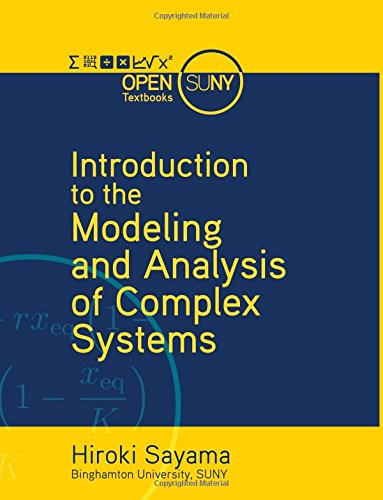
Introduction to the Modeling and Analysis of Complex Systems
by Hiroki Sayama
Publisher: Open SUNY Textbooks 2015
ISBN/ASIN: 1942341083
Number of pages: 498
Description:
This textbook offers an accessible yet technically-oriented introduction to the modeling and analysis of complex systems. The topics covered include: fundamentals of modeling, basics of dynamical systems, discrete-time models, continuous-time models, bifurcations, chaos, cellular automata, continuous field models, static networks, dynamic networks, and agent-based models.
Download or read it online for free here:
Download link
(19MB, PDF)
Similar books
 Methods and Techniques of Complex Systems Science: An Overview
Methods and Techniques of Complex Systems Science: An Overviewby Cosma Rohilla Shalizi - arXiv
The main methods and techniques of complex systems science. It distinguishes among the broad patterns which recur across complex systems, the topics complex systems science studies, the tools employed, and the foundational science of complex systems.
(9541 views)
 Systems Analysis in Public Policy: A Critique
Systems Analysis in Public Policy: A Critiqueby Ida Russakoff Hoos - University of California Press
This is an inquiry into systems analysis, its origin and applications, its uses and abuses, its present impact and future implications. Systems analysis requires serious contemplation because of its central role in public planning.
(10521 views)
 Linear Systems Theory and Introductory Algebraic Geometry
Linear Systems Theory and Introductory Algebraic Geometryby Robert Hermann - Math Sci Press
Systems theory offers a unified mathematical framework to solve problems in a wide variety of fields. This mathematics is not of the traditional sort involved in engineering education, but involves virtually every field of modern mathematics.
(14807 views)
 Discovering Artificial Economics
Discovering Artificial Economicsby David Batten - Westview Press
This is an informal and revealing introduction to the ideas of modern systems theory and self-organization as they apply to problems in the economic realm. David Batten interleaves anecdotes and stories with technical discussions.
(15216 views)